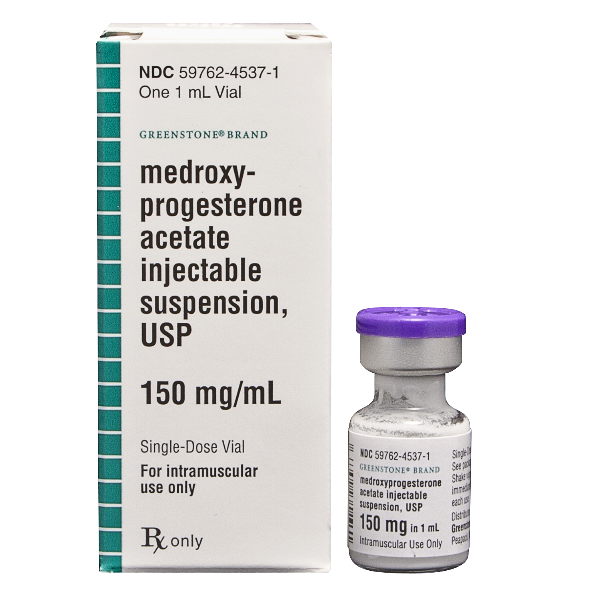🔹 Medroxyprogesterone Acetate Injection 150 mg/mL – As Licensed
📄 Description:
Medroxyprogesterone Acetate (MPA) 150 mg/mL injection is a long-acting progestin-only injectable contraceptive. It is also used for endometriosis, menstrual disorders, and sometimes in hormone-sensitive cancers. It provides sustained release of the hormone when administered intramuscularly.
💊 Prescription / Use:
Indications:
- Long-term contraception (up to 3 months per injection)
- Dysfunctional uterine bleeding
- Endometriosis
- Secondary amenorrhea
- Palliative treatment of endometrial or renal carcinoma
Dosage (for contraception):
- 150 mg every 3 months (12–13 weeks) by deep intramuscular injection, usually in the gluteal or deltoid muscle.
Route: Intramuscular (IM) injection
🔬 Nature:
- Type: Synthetic progestin hormone
- Class: Hormonal contraceptive / Hormone therapy
- Form: Sterile injectable suspension
- Mechanism of Action:
- Inhibits ovulation
- Thickens cervical mucus
- Thins the endometrial lining
🌟 Advantages:
- Highly effective and long-acting (3 months)
- No daily pills needed
- Suitable for breastfeeding women
- Decreases menstrual cramps and blood loss
- May reduce risk of endometrial cancer and iron-deficiency anemia
- Privacy: No visible signs of contraceptive use
📦 Packaging:
- Available in 1 mL vials or prefilled syringes (150 mg/mL)
- Single-dose packaging
- Clearly labeled with strength, batch number, and expiry date
🧊 Storage:
- Store at 15°C to 30°C (room temperature)
- Do not freeze
- Shake well before use (suspension form)
- Protect from direct light
⚠️ Precautions:
Contraindications:
- Known or suspected pregnancy
- History of thrombosis or thromboembolic disorders
- Liver dysfunction or liver tumors
- Known or suspected breast/genital malignancy
- Undiagnosed vaginal bleeding
Use with caution in:
- Adolescents (due to potential effect on bone density)
- Patients with a history of depression
- Diabetics (may alter glucose tolerance)
Common Side Effects:
- Irregular bleeding or amenorrhea
- Weight gain
- Headache, dizziness, or fatigue
- Bone density reduction with long-term use
- Delayed return to fertility (4–10 months post last injection)
👩⚕️ Patient Advice:
- Administered every 3 months by a healthcare provider
- Not suitable if immediate return to fertility is desired
- Calcium and Vitamin D intake recommended for bone health
- Expect menstrual changes (light bleeding or no periods)
- Inform doctor if you experience:
- Severe headaches
- Vision problems
- Persistent abdominal pain
- Mood changes
- Do not use if pregnant—pregnancy test may be needed before first dose
- Carry a medical alert card stating you’re using injectable contraception

